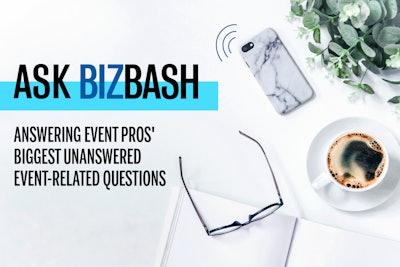
Trying to navigate the industry's new normal? BizBash is here to help. Every week, we'll be tackling your questions on the nitty-gritty details of events. Submit questions on BizBash's Instagram, Twitter, Facebook, or LinkedIn pages, or email us at [email protected].
So all your budget forecasting for the year was destroyed by the COVID-19 pandemic? You are definitely not alone.
If you're shifting to virtual, you're likely wading through a series of unfamiliar costs—including how to price your event tickets. To help you out, BizBash chatted with two top event pros who have been navigating this virtual world: Martyn Clarkson, the vice president of strategy and planning for George P. Johnson's Digital Remote Experience team in New York, and Erica Spoor, chief event strategist for Impact Point Group in Denver.
Clarkson begins by noting that whether your event is in-person or online, a good pricing strategy should be defined by your goals, the type of attendees you have and want, and the value you're offering your audience and sponsors. "We know that a well-managed pricing strategy is a virtuous cycle," he says. "It affects perception of value, can create better-aligned audience groups, can raise the value of community interaction, can attract sponsors, can reinforce your position in the market, and ultimately the revenue can allow for greater investment and drive an even better experience. Likewise, if you get it wrong, it can quickly disassemble the event you have spent years building."
But how much does that strategy change when it comes to virtual? "The question of whether or not to charge a fee for virtual events is top of mind for all of us in the industry," says Spoor, whose team has spent the last six weeks actively analyzing 60 proprietary conferences and found that only two of them have charged a fee ($79 to $150) to access in-depth workshops or expert-led sessions. But ultimately, she believes that even a nominal cost may encourage people to attend and engage.
"What it comes down to is what type of content you are providing for the fee, your target audience, and what your goals are for the event," Spoor adds. "For instance, if you’re hosting a customer event featuring thought leaders and product updates, free may entice more engagement. However, if you’re an association, which traditionally depends on event revenue as a significant portion of their operating revenues, requiring a fee might be necessary to cover operational expenses."
Related: Explore BizBash's coverage of all-things virtual.
Clarkson agrees that pricing should depend on the type of event. "If historically your event's value was largely influenced by face-to-face networking and connection, your pricing structure will likely be impacted more than an event that has value based on content and ongoing access to people and learning opportunities," he notes. "Look to your marketing teams and agency to honestly define what your event's value is to your attendees."
Spoor adds, "Whether you decide fee or free for your upcoming event, remember that digital events can be just as valuable as in-person events, and attendees want to be inspired and connected now more than ever—it’s important to deliver."
Finally, Clarkson notes that pricing strategies will likely evolve as virtual events get more advanced and the world adjusts to this new normal. "At the moment, we are operating in a time of grace. Brands are making access, content, and experiences available to audiences everywhere in an effort to aid the COVID-19 response," he says. "As economies around the globe begin to reopen, this approach will likely evolve, and brands need to be ready with a considered pricing strategy that will deliver value and build their experiences within our new ways of working."
Further Reading:
What You Need to Know About the New Trend in Conference Ticketing
How Much Should Food Festivals Charge, and Other Tactical Questions for New Events
Are Value-Added V.I.P. Packages for Trade Shows Better Than Early Bird Pricing?



















